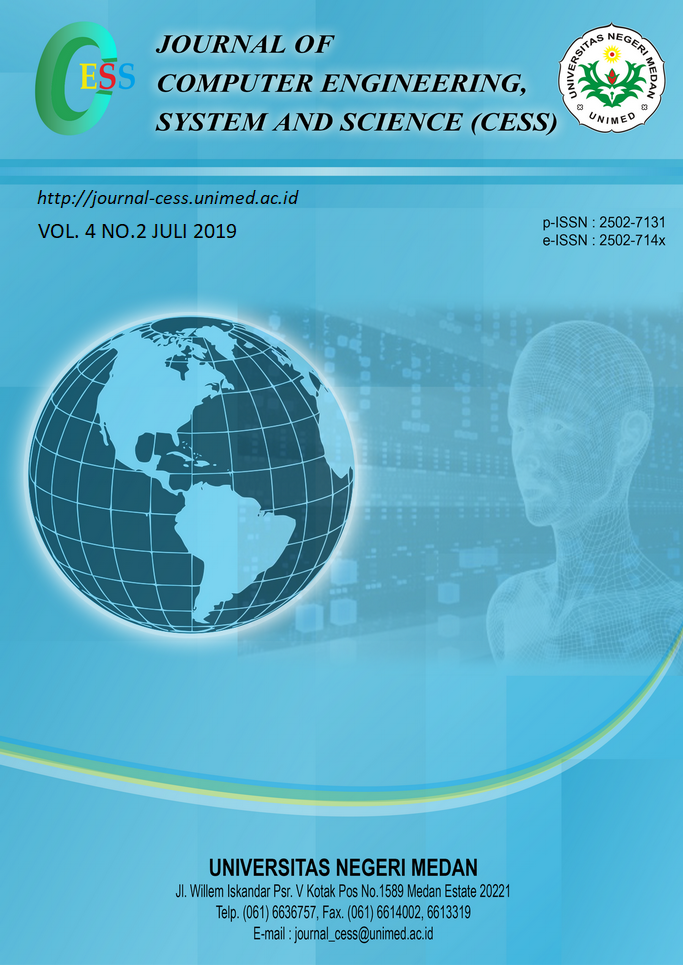BRUSHLESS DC MOTOR SPEED CONTROL USING ANT COLONY OPTIMIZATION
DOI:
https://doi.org/10.24114/cess.v4i2.13430Keywords:
Keywords—PID, Ant Colony, Overshoot, Settling time, BLDC MotorAbstract
Dibandingkan dengan motor DC, BLDC memiliki biaya perawatan yang lebih rendah dan kecepatan yang lebih tinggi akibat tidak digunakannya brush. Pada umumnya motor jenis ini menggunakan sikat dan mengoperasikannya sangat mudah tinggal dihubungkan dengan sumber DC sehingga motor langsung bekerja. Algoritma Ant Coloni pada prinsipnya mencari sumber makanan berdasarkan jejak feromone yang kemudian secara berkelompok akan mengikuti jejak yang memiliki feromone yang terbesar. Dengan prinsip ini algoritma akan mencari parameter yang paling optimal untuk diisikan pada parameter PID, sehingga didapatkan kendali optimal pada kecepatan BLDC Motor. Hasil optimasi ant colony didapatkan nilai fitness function sebesar 79.4892, dengan 50 kali iterasi, dan parameter nilai PID yang optimal di mana, parameter P (Proportional) sebesar 1.3829, I (Integral) sebesar 0.9869, dan D (Derivative) sebesar 0.4360. Dengan beberapa case kecepatan BLDC motor, dengan kendali PID Ant Colony didapatkan kinerja system optimal dengan overshoot yang minimum dan settling yang cepat.Downloads
References
M. R. Djalal, D. Ajiatmo, A. Imran, and I. Robandi, "Desain Optimal Kontroler PID Motor DC Menggunakan Cuckoo Search Algorithm," SENTIA 2015, vol. 7, 2015.
Q. Aliklas, N. Satyahadewi, and H. Perdana, "PENERAPAN ALGORITMA MAX-MIN ANT SYSTEM DALAM PENYUSUNAN JADWAL MATA KULIAH DI JURUSAN MATEMATIKA FMIPA UNTAN," BIMASTER, vol. 8.
J. Bichagatti, "Optimal PID control of a brushless DC motor using PSOtechnique."
V. K. S. Patel and A. Pandey, "Modeling and performance analysis of PID controlled BLDC motor and different schemes of PWM controlled BLDC motor," International Journal of Scientific and Research Publications, vol. 3, pp. 1-14.
H. Ibrahim, F. Hassan, and A. O. Shomer, "Optimal PID control of a brushless DC motor using PSO and BF techniques," Ain Shams Engineering Journal, vol. 5, pp. 391-398, 2014.
K. Premkumar and B. Manikandan, "Fuzzy PID supervised online ANFIS based speed controller for brushless dc motor," Neurocomputing, vol. 157, pp. 76-90, 2015.
M. R. Djalal, M. Y. Yunus, A. Imran, and H. Setiadi, "FLOWER POLLINATION ALGORITHM UNTUK OPTIMASI PENGENDALI PID PADA PENGENDALIAN KECEPATAN MOTOR INDUKSI," JETri Jurnal Ilmiah Teknik Elektro, pp. 81-100, 2017.
L. Dwi, R. D. Muhammad, W. Widodo, and R. Imam, "Optimization of PID Controller Design for DC Motor Based on Flower Pollination Algorithm," 2016.
M. R. Djalal, H. Nurohmah, A. Imran, and M. Y. Yunus, "Aplikasi Metode Cerdas untuk Optimasi Controller PID Motor DC Berbasis Firefly Algorithm," Jurnal Nasional Teknik Elektro, vol. 6, pp. 76-83, 2017.
M. R. Djalal and R. Rahmat, "OPTIMISASI KONTROL PID UNTUK MOTOR DC MAGNET PERMANEN MENGGUNAKAN PARTICLE SWARM OPTIMIZATION," Jurnal TAM (Technology Acceptance Model), vol. 8, pp. 117-122, 2017.
A. Asri, M. R. Djalal, and R. Rahmat, "DESAIN OPTIMAL KONTROLER PROPORSIONAL INTEGRAL MOTOR DC MENGGUNAKAN ALGORITME PARTICLE SWARM OPTIMIZATION," JETri Jurnal Ilmiah Teknik Elektro, vol. 15, pp. 155-170, 2018.
M. R. Djalal, A. Pangkung, M. Marhatang, and S. Sonong, "FIELD-ORIENTED CONTROL PERMANENT MAGNET MOTOR SINKRON MENGGUNAKAN ALGORITMA KUNANG-KUNANG," Jurnal Teknologi, vol. 10, pp. 153-160, 2018.
M. R. Djalal, "Modifikasi Desain PID Controller Pada Permanent Magnet Synchronous Motor Dengan Flower Pollination Algorithm."
Sarjana. (2016). PENGERTIAN BRUSHLESS DC MOTOR. Available: https://onexpirience.wordpress.com/2016/09/04/first-blog-post/
O. Oguntoyinbo, "PID control of brushless DC motor and robot trajectory planning simulation with MATLAB®/SIMULINK®," 2009.
Downloads
Published
How to Cite
Issue
Section
License
Copyright (c) 2019 Computer Engineering, Science and System Journal

This work is licensed under a Creative Commons Attribution 4.0 International License.















